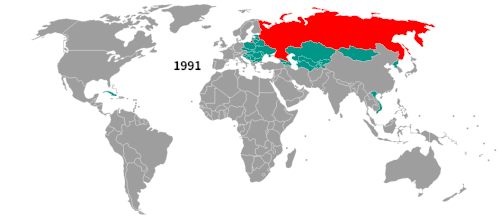Visa policy of Russia
The visa policy of Russia deals with the requirements which a foreign national wishing to enter the Russian Federation must meet to obtain a visa, which is a permit to travel to, enter, and remain in the country. Visa exemptions are based on bilateral or multilateral agreements. Russia has agreements with scores of countries whose citizens are either exempt from visas or can apply for a visa online (e-visa). Citizens of countries without such an agreement with Russia must obtain a visa in advance from a Russian diplomatic mission or visa centre.
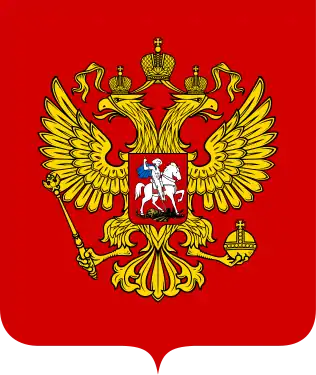 |
|---|
| This article is part of a series on the politics and government of the Russian Federation |
|
|
Foreign citizens, while in the territory of Russia, must comply with the legislation of Russia, including requirements of customs, border and immigration regimes, rules of travel finance, registration, internal movement within the territory of Russia and extensions of stay. Nothing limits the right of competent authorities of Russia to deny entry or to shorten the period of stay in the territory of Russia for foreign citizens.
Travel restrictions due to the COVID-19 pandemic
Due to the COVID-19 pandemic, Russia has imposed the following temporary travel restrictions:
On January 27, Russia resumes flights with Finland, Vietnam, India and Qatar.[1]
From 15 August 2020, restrictions are lifted for citizens of Switzerland.[2]
From 1 August 2020, restrictions on entry to Russia were lifted for citizens of Abkhazia,[3] Tanzania, Turkey, and the United Kingdom. The issuance of entry visas and invitations has also been resumed.[4]
The issuance of Russian electronic visas for the Far East District, Kaliningrad Oblast, and St Petersburg and Leningrad has been suspended since 18th March 2020 and has not been resumed yet.[5]
For foreign citizens who are in Russia on the basis of a visa or visa-free regime, the duration of temporary stay is suspended From 15 March to 15 June 2020.[6]
From 18 March until a special order of the government,[7] all foreign citizens (except citizens of CIS member nations, Abkhazia, South Ossetia from 20 March 2020[8][9][10]) are not allowed to enter the Russian Federation.[11][12][13] This does not apply to some category of travels.[14]
From 13 March 2020, temporarily suspended the entry of citizens of Italy travelling for educational, work, private, tourist and transit purposes[15]
From 1 March 2020, entry of foreign citizens from the territory of South Korea through air checkpoints (except Sheremetyevo airport) has been canceled.[16]
From 28 February 2020, temporarily suspended the entry of citizens of Iran travelling for educational, work, private, tourist and transit purposes.[17][18]
From 20 February 2020, temporarily suspended the entry of citizens of China, Hong Kong, Macao, travelling for work, private, educational and tourist purposes.[19]
Border-crossing points
Foreign citizens may enter into the territory of Russia through the border-crossing points open to international passenger traffic. As of 11 June 2020, Russia has 386 checkpoints[20] across the state border of Russia.[21]
Land border with Belarus
Citizens of third countries aren't allowed to cross the Belarus–Russia land border due to a lack of international border crossing points, because passports must be stamped.[22][23]
Visitors are advised[24] to enter mainland Russia via other countries such as ![]() Terehova–Burachki and
Terehova–Burachki and ![]() Senkivka–Novye Yurkovichi.
Senkivka–Novye Yurkovichi.
Entry will be allowed through the road checkpoints on the border between Russia and Belarus in 2021:[25]
- Vitebsk Region Yukhovichi (P46) – Dolostsy (A117) Pskov Oblast
- Vitebsk Region Yezerishche (M8) – Nevel (P23) Smolensk Oblast; Part of European route E95
- Vitebsk Region Liozno (P21) – Kruglovka (P120) Smolensk Oblast
- Vitebsk Region Redki (M1) – Krasnaya Gorka (M1) Smolensk Oblast; Part of European route E30
- Mogilev Region Zvenchatka (P43) – Dubovicka (A130) Smolensk Oblast
- Gomel Region Selishe (M10) – Novozybkov (A240) Bryansk Oblast
Visa exemption
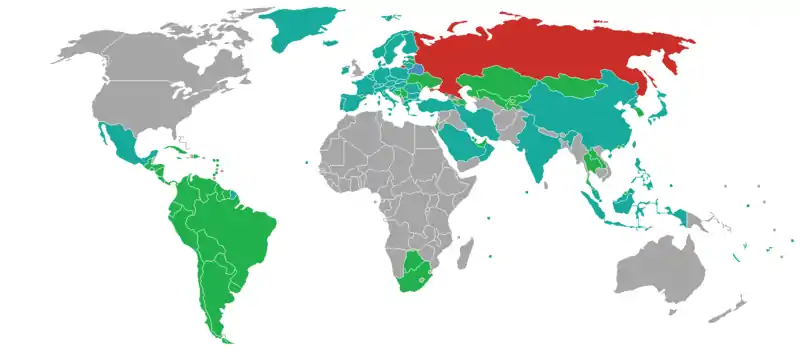
Ordinary passports
Travellers who are nationals of the following 63 nations are not required to obtain a visa prior to visit Russia as long as the length of their trip is within the visa waiver limit listed below.[30][31]
From 2014, citizens of these countries—except for citizens of Belarus and South Ossetia, who have the right to unlimited visa-free entry to Russia—must not stay longer than 90 days within any 180-day period. Resetting the allowed period by leaving and re-entering the country is no longer allowed. Overstaying up to 180 days is punishable by a three-year entry ban, 180–270 days by a five-year entry ban, and over 270 days by a ten-year entry ban.[32]
|
Indefinite period (2) 90 days (42)
60 days (5) 30 days (11) 14 days (3) |
ID – May enter with a national ID card
ID(KZ) – May enter with a national ID card if arriving from Kazakhstan
1 – 90 days within any 365-day period
2 – 90 days within any one-year period
3 – 60 days within any 180-day period
4 – 30 days within any 60-day period
- On 18 February 2017 the President of Russia has signed the decree "About Recognition of the Documents Issued to the Citizens of Ukraine and Persons Without Citizenship Living in Territories of Certain Districts of the Donetsk and Luhansk Regions of Ukraine". Holders of passports of
 Donetsk People's Republic and
Donetsk People's Republic and  Luhansk People's Republic can carry out entry into the Russian Federation and departure from the Russian Federation without execution of visas. The decree is applied temporarily, for the period before political settlement of a situation in certain districts of the Donetsk and Luhansk regions of Ukraine on the basis of the Minsk Agreement.[33]
Luhansk People's Republic can carry out entry into the Russian Federation and departure from the Russian Federation without execution of visas. The decree is applied temporarily, for the period before political settlement of a situation in certain districts of the Donetsk and Luhansk regions of Ukraine on the basis of the Minsk Agreement.[33] - From 29 December 2018 citizens of Ukraine who residents of the territories of certain districts of Donetsk and Luhansk regions of Ukraine can visit visa free for 180 days.[34]
- Persons holding a Macau Special Administrative Region passport.
- Persons holding a letter of guarantee/invitation and a tourist voucher.
- Persons holding a biometric passport.[35]
- Persons holding a Hong Kong Special Administrative Region passport.
| Date of visa changes |
|---|
Cancelled:
As the Russian Federation
|
Tour groups
Citizens of ![]() China may visit Russia without a visa for up to 15 days if traveling as part of a tour group (from 5 to 50 persons) that is accompanied by a representative of a tour operator registered in both countries.
China may visit Russia without a visa for up to 15 days if traveling as part of a tour group (from 5 to 50 persons) that is accompanied by a representative of a tour operator registered in both countries.
Common visa
On 19 June 2020, Russia and Belarus have signed an agreement on mutual recognition of visas.[75] After ratification visa-free entry will be available for holders of a valid visa or residence permit of Belarus.[76]
Fan ID

In 2018 the Russian government introduced a visa-free entry for holders of a FanID, for spectators of sports, cultural, and other events.
Holders of tickets for matches of the 2018 FIFA World Cup championship could enter Russia without a visa from 4 June to 15 July 2018 by using a personalized card (also known as a fan passport or fan-ID) and their valid passport. Spectators admitted with a Fan ID had to leave Russia no later than 26 July 2018. According to the Border Service of Russia over 633,000 foreign nationals arrived in Russia using a FanID rather than a visa. Of these, 68,000 were citizens of China, 52,000 from the United States, 44,000 from Mexico, 31,000 from the UK, and 30,000 from Germany.[77]
Russia later extended its visa-free travel regime for foreign soccer fans until the end of 2018.[78]
Holders of tickets for matches of the UEFA Euro 2020 championship in Saint Petersburg will be able to enter Russia without a visa during the matches in 2021.[79][80][81]
Visa-free visits for up to 72 hours for cruise ship and ferry passengers
Since May 2009 international tourists entering by regular ferry via several ports have been able to stay in Russia visa-free for up to 72 hours, provided that they spend the night on-board or in accommodation specifically approved by the travel agency.[82]
In addition tourists entering by tourist cruise ships can leave the ship visa-free on tours organized by any authorized local tour company, when entering Russia through the ports of Anadyr, Kaliningrad, Korsakov, Novorossiysk, Murmansk, Sevastopol, Sochi, Saint Petersburg (Big port Saint Petersburg and Passenger Port of St. Petersburg), Vladivostok, Vyborg, Zarubino.[83][84][85]
Entry to the port of St. Petersburg by regular ferry can be done only from the ports of Tallinn (Estonia) or Helsinki (Finland). It is also possible to travel visa-free for 72 hours from the port of Stockholm with the stop in Helsinki.[86][87]
Visa-free zones
 Japan — Group travel to central and southern Kuril Islands for pre-approved lists of the Foreign Ministry. Visits are carried out on the basis of identity cards and inserts.[88]
Japan — Group travel to central and southern Kuril Islands for pre-approved lists of the Foreign Ministry. Visits are carried out on the basis of identity cards and inserts.[88]
Visa-free for citizens of Japan who visit the burial place of relatives located in the Kuril Islands and Sakhalin Island, by pre-authorized list in the regional Russian-Japanese consultations.[89] United States — Residents of Alaska who are members of the indigenous population do not require a visa to visit Chukotka Autonomous Okrug if they have relatives (blood relatives, members of the same tribe, native people who have similar language and cultural heritage) in Chukotka. Individuals must be invited by a relative in Chukotka and must leave Chukotka within 90 days. Entry points are in Anadyr, Provideniya, Lavrentiya and Uelen.[90][91] The agreement was signed between USSR and USA on 23 September 1989[92] but came into force on 17 July 2015 after ratification by the United States.[93]
United States — Residents of Alaska who are members of the indigenous population do not require a visa to visit Chukotka Autonomous Okrug if they have relatives (blood relatives, members of the same tribe, native people who have similar language and cultural heritage) in Chukotka. Individuals must be invited by a relative in Chukotka and must leave Chukotka within 90 days. Entry points are in Anadyr, Provideniya, Lavrentiya and Uelen.[90][91] The agreement was signed between USSR and USA on 23 September 1989[92] but came into force on 17 July 2015 after ratification by the United States.[93]
Local border traffic
From 6 June 2013 residents of the border areas of Latvia who have a permit for local border traffic can visit the border areas of Russia without a visa. From 16 December 2018 amendments to the current agreement entered into force. The procedure for obtaining a permit was simplified, total period of stay (within 180 days) was canceled, and the stamping of travel documents at the border crossing was canceled.[96]
From 29 May 2012 residents of the border areas of Norway who have a permit for local border traffic can visit the border areas of Russia without a visa. From 4 March 2017 the Protocol on amendments to the current agreement entered into force – residents of area of Neiden received the right to receive a permit for local border traffic.[98][99]
| The territory covered by the agreement with Norway | |
|---|---|
| Norway | Finnmark county: municipality of Sør-Varanger, within a zone of 30 km from the border + area of Neiden. |
| Russia | Pechengsky District: Korzunovo municipality, Zapolyarny municipality and the territory of Pechenga municipality and Nickel municipality within a zone of 30 km from the border. |
 Poland — 30 days, for a maximum total stay of 90 days within a 180-day period for holders of border traffic permit[100][101]
Poland — 30 days, for a maximum total stay of 90 days within a 180-day period for holders of border traffic permit[100][101]
From 27 July 2012 residents of the border areas of Poland who have a permit for local border traffic can visit Kaliningrad Oblast without a visa. The agreement has been suspended for an indefinite period by Poland from 4 July 2016.[102][103]
| The territory covered by the agreement with Poland | ||
|---|---|---|
| Poland | Pomeranian Voivodeship | Towns: Gdańsk, Gdynia, Sopot. Gdańsk County, Malbork County, Nowy Dwór Gdański County, Puck County. |
| Warmian-Masurian Voivodeship | Towns: Elbląg, Olsztyn. Bartoszyce County, Braniewo County, Elbląg County, Giżycko County, Gołdap County, Kętrzyn County, Lidzbark County, Mrągowo County, Olecko County, Olsztyn County, Węgorzewo County. | |
| Russia | Kaliningrad Oblast | |
Crew members
Visa is not required for crew members of airlines, sea crew, river crew, rail crew that have a bilateral agreement with the Russian government exempting crew members from visa requirements.[104][105]
Citizens of following countries may visit Russia without a visa if they are travelling as part of the airline crew: Afghanistan,[106] Algeria,[107] Austria,[108] Belgium,[109] Bulgaria,[110] Canada,[111] China,[112] Croatia,[113][114] Cyprus,[115] Czech Republic,[116] Denmark,[117] Egypt,[118] Ethiopia,[119] Finland,[120] France,[121] Germany,[122] Greece[123] Iceland,[124] India,[125] Iraq,[126] Italy,[127] Japan,[128] Jordan,[129] Lebanon,[130][131] Libya,[132] Lithuania,[133] Luxembourg,[134] Malta,[135] Netherlands,[136] North Korea,[137] North Macedonia,[138] Norway,[139] Oman,[140] Poland,[141] Portugal,[142] Qatar,[143] Romania,[144] Singapore,[145] Spain,[146] Sri Lanka,[147] Sweden,[148] Switzerland,[149] Turkmenistan,[150] United Arab Emirates,[151] United Kingdom,[152] Vietnam.[153]
Agreements were signed with Italy[154] and Latvia[155] and they yet to be ratified.
Russian Government has instructed the Foreign Ministry to sign an agreement with Georgia,[156] and Tunisia.[157]
Citizens of following countries may visit Russia without a visa if they are travelling as part of the sea crew: Bulgaria,[110] China,1 [112] Croatia,[113][114] Cyprus,[115] DR Congo,[158] Egypt,[159] France,[121] Iran,[160] Iraq,[161] Lithuania,1 [133] North Korea,[137] Poland,[141] Tunisia,[162] Turkey, Turkmenistan,1 [163] Vietnam.[153]
1 - including riverboats crew
Citizens of following countries may visit Russia without a visa if they are travelling as part of the railway crew: China,[112] North Korea,[164] Turkmenistan.[165]
Visa-free transit
- Direct airside transit
Passengers travelling through international airports do not need a visa for a transit of less than 24 hours in most circumstances,[166] provided a confirmed onward ticket is held and the traveller remains in the international transit area (without clearing regular passport control).[167]
A transit visa is needed when transiting Russia to/from Belarus
The following international Russian airports do not have international transit areas, meaning a transit visa is required to connect there:
|
|
- Saimaa canal
In accordance with a treaty between Russia and Finland, though there are passport controls at borders, a visa is not required for just passing through the Russian part of the Saimaa canal without leaving the vessel.[168]
- Värska–Ulitina road
The road from Värska to Ulitina in Estonia, traditionally the only road to the Ulitina area, goes through Russian territory for one kilometre (0.6 mi) of its length, an area called Saatse Boot. This road has no border control, but there is no connection to any other road in Russia. It is not permitted to stop or walk along the road. This area is a part of Russia but is also a de facto part of the Schengen area.
Diplomatic and service category passports
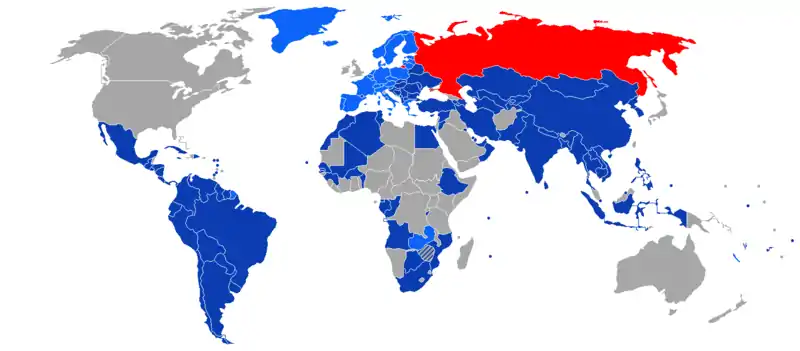
Under reciprocal agreements, holders of diplomatic or various categories of service passports (official, service, special, consular) issued by the following countries, territories and jurisdictions are allowed to enter and remain in Russia for up to 90 days (unless otherwise noted) without a visa:[30][31]
D* – diplomatic passport only (diplomatic and service passports for Bulgaria, Croatia, Cyprus, Hungary, Romania and Slovakia)
D — diplomatic passports
S — service passports
O — official passports
Sp — special passports
C — consular passports
1 – unlimited
2 – 3 months
3 – 90 days within any 365-day period
4 – 90 days within any one-year period
5 – 90 days within any 180-day period
6 – 60 days
7 – 30 days
8 – 14 days
9 – only for employees of Zimbabwe official institutions in Russia
Among nationals of countries whose citizens are normally visa-exempt, only holders of diplomatic or service category passports of Israel, service passports of Qatar and service passports of the UAE require a visa.
APEC Business Travel Card
The APEC Business Travel Card (ABTC) is a travel document issued to business travellers who are citizens of APEC participating economies. Valid for five years, the card eliminates the need for its holder to possess a visa when visiting other APEC participating economies.
From 1 June 2013,[169][170] holders of passports issued by the following countries who possess an APEC Business Travel Card (ABTC) containing the "RUS" code on the reverse that it is valid for travel to Russia can enter visa-free for business trips for up to 90 days within any 180-day period.[171][172]
ABTCs are issued to nationals of:[173]
Electronic visa
From 8 August 2017, the Ministry of Foreign Affairs of Russia started to implement the eVisa Program. Citizens of the 18 countries[174] could apply eVisa to visit to regions in the Far Eastern Federal District.[175] From 1 July 2019, citizens of the 54 countries could applied for single-entry business, humanitarian and tourist visas to visit the Kaliningrad region.[176] From 8 June 2019, citizens of Taiwan were added to the list for Far East.[177] From 1 October 2019, electronic visas have become valid for Saint Petersburg and Leningrad Oblast.[178] On 24 January 2020, the new list for the Far Eastern e-visa was approved.[179] [180] Thus, the list of countries has become uniform for all regions where an electronic visa is applied.
On 1 January 2021, unified electronic visas were introduced in Russia.[181] On 6 October 2020, in accordance with the Decree of the Government of the Russian Federation No. 2571/2020, the list of States was approved.[182] These are all the countries whose citizens were allowed to enter Russia with an electronic visa as part of the pilot project.
The e-visa is a single entry visa, which is valid for a period of 60 days from the date of issue, and which allows a period of stay in the Russian Federation of up to 16 days from the date of entry. Foreign citizens have the right to freedom of movement within the entire territory of Russia. The 16-day e-visas are issued for private or business visit, tourism, as well as for participating in scientific, cultural, socio-political, economic, sporting events. The application can be submitted no earlier than 40 days and no later than 4 days before the expected date of entry. Applications for a e-visa will be processed in no more than 4 calendar days from the date of submission of the application. The consular fee is $40 (children under 6 years of age get a visa free of charge).[183]
e-Visa allows arrival and departure only through the following border crossing points:[184][185]
Airports (16)
Seaports (6)
|
Railways (2)
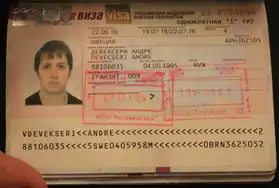
.jpg.webp)


